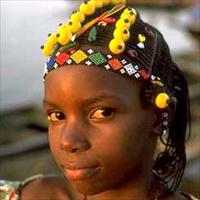BURKINA FASO: Child brides fight child marriage

It was not enough to argue that girls could not legally marry in Burkina Faso before age 17, or even that their lives might be put at risk. Tethered to tradition, some families and community leaders steadfastly resisted multimillion dollar efforts to wipe out child marriage, especially in the Muslim-dominant Sahel region in the north.
UN Population Fund (UNFPA) has given US$7 million dollars to fight child marriage in Burkina Faso since 2002, but child rights organisations noted that in five of the country’s 13 regions, the fatal practice has persisted.
The Sahel region, which has the country’s highest incidence of child marriages, also has the country’s highest incidence of the deadly fistula..
In February 2009, UNFPA, UN Children’s Fund (UNICEF) and the governmental National Population Advisory Council launched a two-year $1.6 million peer education, job training and health services project to bolster girls’ overall security- both before and after marriage.
“We do not mean to eradicate the phenomenon in two years, but we will make sure we have set up [a core group of advocates] to better fight early marriage because the practice is well-rooted in culture,’’ Siaka Traoré, UNFPA’s communications officer told IRIN.
Married girls
He said for the first time in the fight against child marriage in the Sahelian country, married girls are being trained to counsel and educate other girls. The UN-led project has counted more than 400,000 girls aged 12-19 years old –some already married - living in 24 “high risk” zones throughout the country. These areas have the highest occurrence of child marriage, as well as the highest rates of poverty, maternal and infant mortality, unemployment and school abandonment, according to the government.
The project has budgeted US$255,000 to help girls- both married and unmarried- from cash-strapped families stay in school through giving them scholarships for books, supplies, fees, and bicycles for students in remote areas.
In addition, savings clubs and small-business “start up kits” are intended to protect girls’ rights and economic security, regardless of their marital status.
Funded by the UN Trust Fund for Human Security (UNTFHS), the project aims to prevent girls who face “limited mobility, constraints on their time, [and] lack of autonomy” from falling into extreme poverty and further deprivation.
Primary school director Adama Sawadogo in Burkina Faso’s northern village of Gankouna told IRIN once girls leave his school, it becomes much harder for officials to protect them. “If girls leave schools as early as at this age, how do we expect them to know their rights and duties?”
Door-to-door
“We do not have the resources to blanket the country and will count on peer educators and community leaders,” said UNFPA’s Traoré. The two-year project aims to train 144 young married women to encourage both married and unmarried girls to attend school or work, seek health care and not marry early.
In addition, 120 community “opinion leaders” will be recruited to denounce child marriage.
But Traoré said long-held cultural beliefs cannot easily be dismantled. “You cannot change behaviours by decree.”
Meanwhile, he said young child brides will suffer less with access to lifesaving health care, credit and legal information on their rights.
“You have to work at this over the long term,” said Traoré.
 Back and Next - Back and Next
Back and Next - Back and Next See Also - See Also
See Also - See Also